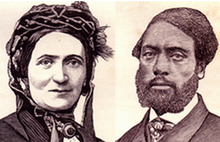
Ellen Craft (1826–1891) and William Craft (September 25, 1824 – January 29, 1900) were American abolitionists who were born into slavery in Macon, Georgia. They escaped to the Northern United States in December 1848 by traveling by train and steamboat, arriving in Philadelphia on Christmas Day. Ellen crossed the boundaries of race, class, and gender by passing as a white planter with William posing as her servant. Their escape was widely publicized, making them among the most famous fugitive slaves in the United States. Abolitionists featured them in public lectures to gain support in the struggle to end the institution.
As prominent fugitives, they were threatened by slave catchers in Boston after the passage of the Fugitive Slave Act of 1850, so the Crafts emigrated to England. They lived there for nearly two decades and raised five children. The Crafts lectured publicly about their escape and opposed the Confederate States of America during the American Civil War. In 1860, they published a written account of their escape titled Running a Thousand Miles for Freedom; Or, The Escape of William and Ellen Craft from Slavery. One of the most compelling of the many slave narratives published before the Civil War, their book reached wide audiences in the United Kingdom and the United States. After their return to the U.S. in 1868, the Crafts opened an agricultural school in Georgia for freedmen's children. They worked at the school and its farm until 1890. Their account was reprinted in the United States in 1999, with both the Crafts credited as authors.